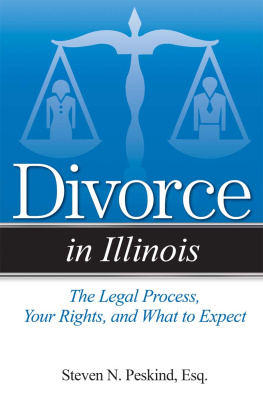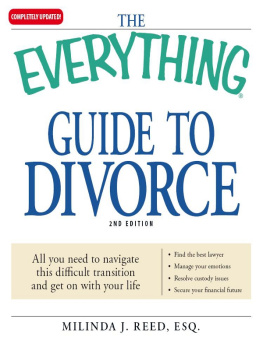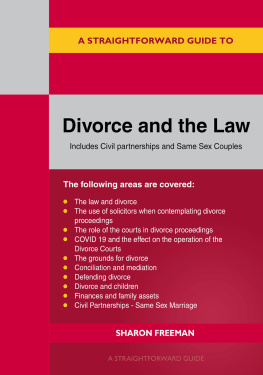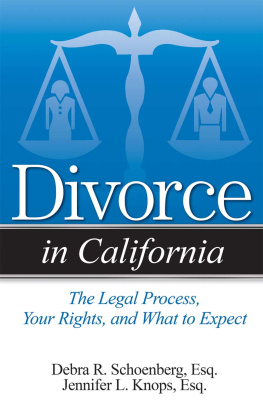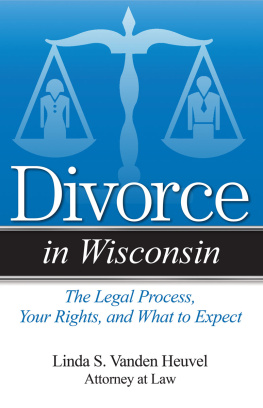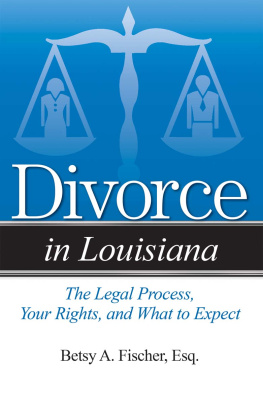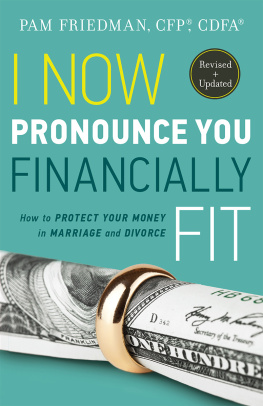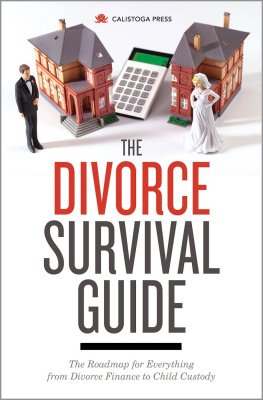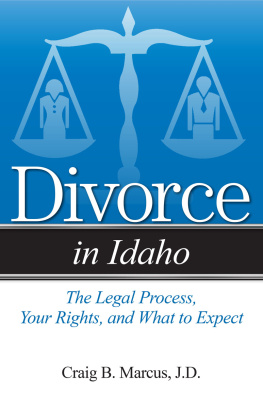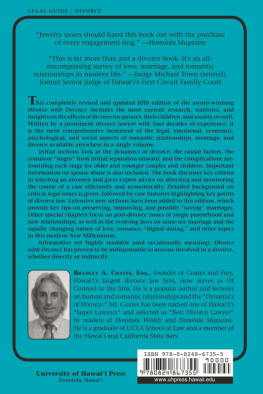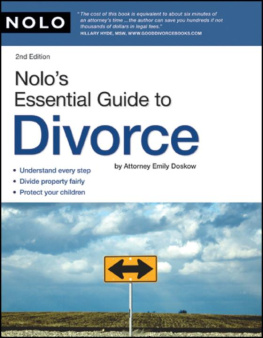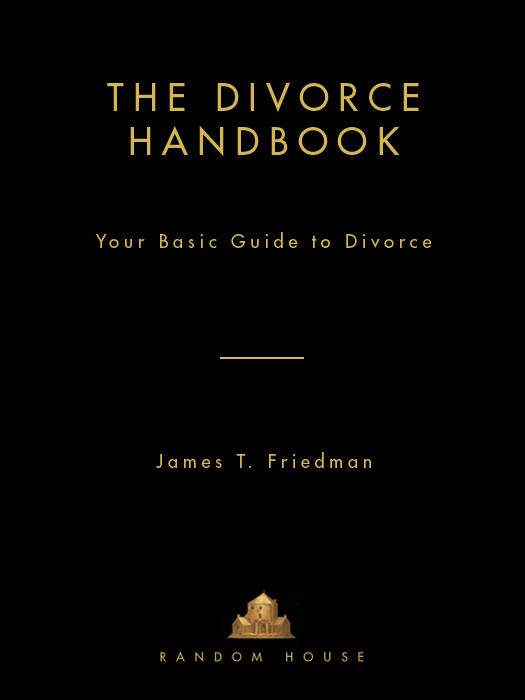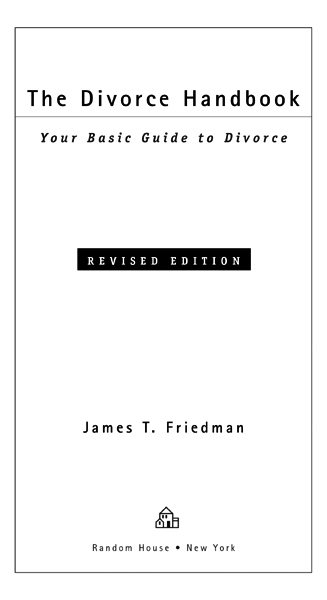To Sol R. Friedman,
divorce lawyer
ACKNOWLEDGMENTS
The author gratefully acknowledges the assistance of his secretary, Pamela Hewitt; his paralegal, Marnie Schloss; his associates, Joshua T. Friedman and Jeffrey I. Garfinkel; his partners, Errol Zavett and Muller Davis; the marital therapists Alan M. Jaffe, Psy.D., and Honey Rosenfeld, LCSW; and the credit expert Bruce Passen in the preparation of this revision and update of The Divorce Handbook.
CONTENTS
LIST OF CHECKLISTS, GUIDES, SAMPLE SCHEDULES, COURT DOCUMENTS, AND WORKSHEETS
Asset/Liability Worksheet
Attorney Retainer AgreementSample
Child Support GuidelinesSamples
Courtroom Dos and Donts for You and Your Witnesses
Credit Guide
Credit History for Married Persons
Dependency Exemption WaiverIRS Form 8332
Deposition Dos and Donts
Deposition QuestionsSample
Hidden Asset Checklist
Hints for Being a Better Witness
Income and Expense Affidavit
Information Frequently Requested at Your Initial Interview
Insurance Worksheet
Joint Parenting AgreementSample (Both Parents Employed)
Order of ProtectionSample
Pretrial MemorandumSample
Qualified Domestic Relations OrderSample
Qualified Medical Child Support OrderSample
Questions to Ask Your Lawyer:
At the Initial Interview
When Considering a Specific Settlement Proposition
Before Trial
Upon Entry of the Final Decree
Settlement Issues Checklist
Settlement Priorities Worksheet
Trial Outline: Child CustodySample
Trial Outline: Grounds (Fault States Only)Sample
Trial Outline: Property and SupportSample
Visitation ProvisionsSample
Windup Checklist (Closing Your File)
Witnesss Guide to the Rules of Evidence
CHAPTER I
Who Needs This Handbook? How to Use It
1. Who needs this handbook?
Every person who is thinking about a divorce or is in the process of getting one needs this handbook.
The book is designed as a practical guide to take you chronologically through the various stages from the first time the subject crosses your mind to the final decree and closing your file. No one person experiences all the steps included in this book, because every divorce differs in the areas of disagreement and extent to which certain issues may be contested in court. The questionanswer format allows you to read only what concerns you at the moment. Reading from cover to cover will give you a perspective on the entire divorcing process.
2. Why do I need this handbook?
A major part of the emotional stress of divorce is being involved in something you dont understand. Divorce unleashes fears of material loss as well as feelings of abandonment and guilt, thus clouding your ability to think clearly about financial settlements, personal needs, and the needs of your children.
Divorce places you at the mercy of a system that has its own language and procedures and seems to move people about like pawns from one courtroom to the next.
For example, if you have experienced any of the following predicaments, you need this workbook.
One day you want a divorce and the next day you want a marriage counselor.
You dont want a divorce but your spouse just filed for oneor has mentioned the possibility.
You have just come from your first appointment with a lawyer and he used a number of words you didnt understand but didnt ask him to explain.
Your spouse is jeopardizing your job with phone calls to your employer and/or lies to your friends and coworkers.
Your spouse has missed his temporary support payment for the tenth time.
Every time you call your lawyer you forget two points of the five that you wanted to coverbecause she sounds hurried.
Your divorce seems to be standing stilland youre standing in quicksand.
With inflation youre bleeding from support payments. Can they be modified?
Court continuances are ruining your schedule. Doesnt anybody else work?
Your lawyer is in court or in conference every time you call.
You never know when youll see your children. They seem brainwashed against you.
The silver and the piano are missing.
You have agreed to too large a support payment and cant manage financially.
You feel helpless and your life seems out of control.
3. How can a lawyer use this handbook?
By using it with you as a guide at various stages of your case. If, for example, he suggests you review the Hidden Asset Checklist, you may help uncover assets that never would have been discovered otherwise. Application of your factual situation to the sample preparation of your case at less expense. Lack of communication is the single greatest problem between busy divorce lawyers and emotional clients. This handbook provides you with a common source of communication and should be the basis for your organization and preparation at every stage of negotiation or litigation. Lawyers, give a copy to your clients and ask them to refer to it before asking you questions. They will still have questions, but they will be more focused.
4. How can this handbook help me?
It guides you through the divorcing process step by step and provides perspectivean overview of where you are now and should expect to be later. This handbook puts you in charge of your life at this difficult time.
It identifies important information relevant to your case.
It also tells you where, when, and how to find that information.
It organizes and stores the information in one readily available place.
It reduces your insecurity and frustration by involving you in the process and showing that you are not alone.
It helps you select a lawyer and deal with him or her effectively.
It enables the lawyer to give better answers because you will ask better questions.
It provides resource information for particular problems through an extensive bibliography.
It includes a glossary of legal terms common to divorce.
Its your security blanketand it covers everything youll need to know about the divorcing process.
It puts you in the habit of asking questions. Even if you think you know the answer, ask!
5. Why cant I let my lawyer do it all?
Because he probably wont. And cant.
For one thing, he is too busy to answer every question at length, and for another, you probably wont know the right ones to ask. Your frustration will grow in direct proportion to the court orders, continuances, judgments, and situations you do not understand or know how to handle.
Furthermore, your lawyer should not do it all. It is your responsibility to find and organize the necessary records and documents. Few peopleor lawyerscan afford to pay an accountant or other professional just to gather information and put it in usable form for the case.
You should not be a passive participant in your own divorce. You, the client, have a vital role to play in the divorcing process.
6. Why cant my recently divorced friends advise me?
Every divorce case and set of circumstances are different. Your friend may have four more children than you do, or none. She may have a trust fund or he may like the vegetarian life. They may have living parents with a guesthouse, a supermarket in the family, or a brother-in-law who is a plumber. Remember, each divorce is uniquelike the marriage that preceded it.


